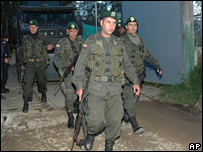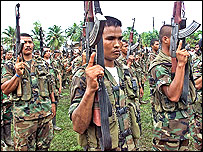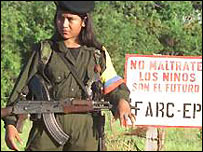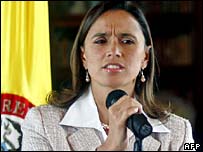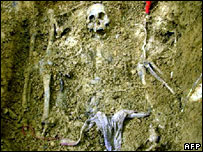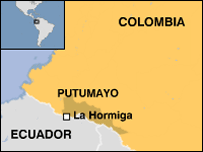I don't know much about Colombian negotiation's, but I do know in the past the US Embassy there worked very hard to get our citizens released.
This has got to made a shitty situation worse
Colombian leader ends Farc talks
Colombian President Alvaro Uribe has broken off negotiations on a prisoner exchange with the left-wing guerrilla group Farc.
Mr Uribe said he blamed the group for Thursday's bombing in Bogota that left more than 20 people injured.
"The only road open to us is the military rescue of those kidnapped," Mr Uribe said.
Farc is holding more than 3,000 people hostage, including some 60 politicians and foreigners.
'Farce'
The president's response to Thursday's bombing in the capital was swift and unequivocal, the BBC's Jeremy McDermott says.
Mr Uribe slammed the door on the possibility of sitting down with Farc and discussing a prisoner exchange.
"We cannot continue the farce of a humanitarian exchange [of prisoners] with the Farc," he told reporters in Bogota.
Instead, Mr Uribe said he was considering a military rescue of the hostages.
The news is a bitter blow to the family of those held by the guerrillas, some of whom have spent more than seven years in captivity, our correspondent says.
The most high-profile of the Farc prisoners is Ingrid Betancourt, former Colombian presidential candidate who also has French citizenship.
Ms Betancourt's mother wept when she heard Mr Uribe's comments.
Farc - the Revolutionary Armed Forces of Colombia - is the largest rebel group in Colombia. It has been fighting the government for more than four decades. The government in Bogota is continuing, however, with talks in Havana with the second rebel group, the ELN.
Story from BBC NEWS:
http://news.bbc.co.uk/go/pr/fr/-/2/hi/americas/6072078.stm
Published: 2006/10/20 22:30:19 GMT
© BBC MMVI
This has got to made a shitty situation worse
Colombian leader ends Farc talks
Colombian President Alvaro Uribe has broken off negotiations on a prisoner exchange with the left-wing guerrilla group Farc.
Mr Uribe said he blamed the group for Thursday's bombing in Bogota that left more than 20 people injured.
"The only road open to us is the military rescue of those kidnapped," Mr Uribe said.
Farc is holding more than 3,000 people hostage, including some 60 politicians and foreigners.
'Farce'
The president's response to Thursday's bombing in the capital was swift and unequivocal, the BBC's Jeremy McDermott says.
Mr Uribe slammed the door on the possibility of sitting down with Farc and discussing a prisoner exchange.
"We cannot continue the farce of a humanitarian exchange [of prisoners] with the Farc," he told reporters in Bogota.
Instead, Mr Uribe said he was considering a military rescue of the hostages.
The news is a bitter blow to the family of those held by the guerrillas, some of whom have spent more than seven years in captivity, our correspondent says.
The most high-profile of the Farc prisoners is Ingrid Betancourt, former Colombian presidential candidate who also has French citizenship.
Ms Betancourt's mother wept when she heard Mr Uribe's comments.
Farc - the Revolutionary Armed Forces of Colombia - is the largest rebel group in Colombia. It has been fighting the government for more than four decades. The government in Bogota is continuing, however, with talks in Havana with the second rebel group, the ELN.
Story from BBC NEWS:
http://news.bbc.co.uk/go/pr/fr/-/2/hi/americas/6072078.stm
Published: 2006/10/20 22:30:19 GMT
© BBC MMVI

